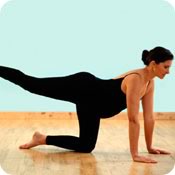
If you are a beginner to aerobic training, start out with walking or something that raises your heart rate a little bit, nothing that will get you out of breath. After all, just being pregnant causes your heart rate to increase from its normal tempo. Try doing this for 10 minutes the first few times you exercise, slowly progressing your time. As you increase the time to where you can handle 30 minutes at that pace, start adding a little more intensity. So you could do 2 or 3 days of 30 minute training at your initial pace, with a 10-minute day at an increased intensity. As a rule of thumb, you should be able to carry on a conversation while exercising. If not, you need to slow down the tempo. You don't need to aim for a really vigorous workout. Another area of concern for the beginner is energy level. Most people expect to exercise the first few weeks and experience a shot of energy. In actuality, the opposite occurs at first. Your body isn't use to the added work, which causes you to feel fatigued and even drained, especially if you over do it. Don't get discouraged, it's natural to feel this way until your body adapts. As this occurs, your cardiovascular system becomes more conditioned, causing you to have more energy and focus throughout the day. It is important to note, however, that you will not be unable to maintain the energy level you had pre-pregnancy. Exercise simply gives you a boost over what you might otherwise be experiencing. The changes within your body are already using up more energy than before. Take care of yourself during and after the workout Over-doing it will cause stiffness and soreness, causing many women to give up on exercise completely. If you do strain your muscles, there are a few things you can do to feel better. Exercise actually breaks your muscles down - sleep, nutrition, and hydration play a vital role in their growth. Proper rest, feeding your body healthy food, and drinking plenty of water will help your body recover much quickly. Also, try a low impact exercise at a low to moderate intensity and stretching, both of which will deliver more oxygen and blood to help clean out the waste and bring more nutrients to your muscles. Dehydration might also be a concern. Your body loses a large quantity of water during exercise, so it is very important to drink more water as you exercise. Active people should drink at least 10-12 eight-ounce cups a day. Make sure to take plenty of breaks throughout to refuel. Headaches, stiffness and cramping are all results of dehydration. Continued › |
.jpg)





Member Comments